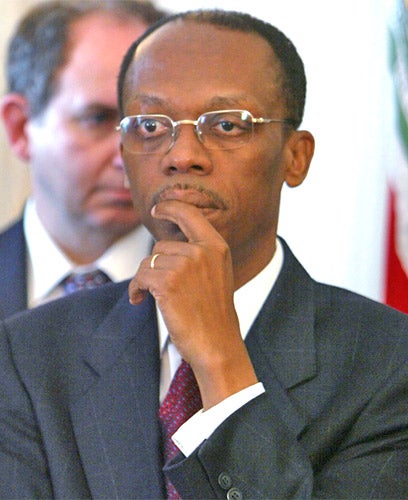The Government of Haiti has agreed to issue its exiled former president Jean-Bertrand Aristide with a diplomatic passport, paving the way for a return which promises to further cloud the country's muddy political waters. Lawyers for Mr Aristide, who has been living in South Africa since he was ousted in a 2004 coup, were assured yesterday that Haiti's cabinet would issue the document, should he choose to submit the necessary paperwork.
The decision removes a final hurdle preventing the left-leaning former president from carrying out his promise to return to Haiti "today, tomorrow, at any time", to help the nation rebuild after the earthquake which destroyed its capital city and killed as many as 300,000 people just over a year ago.
It nonetheless comes at a tricky moment. Today will see the official announcement of results from the first round of Haiti's most recent presidential elections, which took place in November and have since sparked occasional public unrest amid allegations of voter fraud.
Mr Aristide's former party, the Famni Lavalas, was banned from that poll on a technicality, after mistakes were discovered in paperwork it submitted to organisers. His presence in the country will inevitably add to pressure for the entire election to be scrapped and repeated.
Further intrigue surrounds the fact that Mr Aristide, 57, will join his lifelong bête noire, Jean-Claude Duvalier, the former dictator known as Baby Doc, in Haiti. Their joint return from exile will further polarise an already-tense political environment.
Mr Aristide, a former Catholic preacher who replaced Mr Duvalier as Haiti's first democratically elected leader in 1986, is romanticised by poorer Haitians, who continue to support his Famni Lavalas in large numbers.
Supporters say that coups which twice removed him from office, in 1991 and 2004, were orchestrated by the US government after he enacted economic reforms – including trade tariffs and increased minimum wages – which damaged American business interests. Opponents have accused him of corruption and human rights abuses, however.
Subscribe to Independent Premium to bookmark this article
Want to bookmark your favourite articles and stories to read or reference later? Start your Independent Premium subscription today.


Join our commenting forum
Join thought-provoking conversations, follow other Independent readers and see their replies